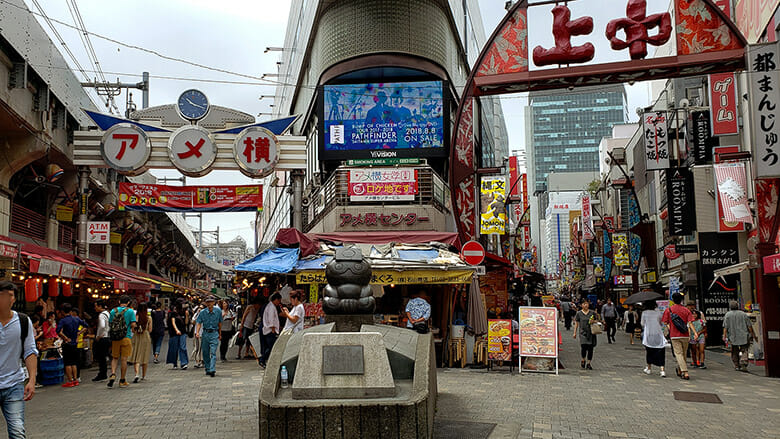
Ameyoko Center Building is famous for its basement wet market selling Chinese and Southeast Asian food
A Japanese buyer has purchased the Ameyoko Center Building in Tokyo from PAG for $53 million as the reopening of Japan’s borders boosts market confidence in the country’s retail and tourism sectors.
The deal for the shopping centre in Tokyo’s Ueno Park area was closed at the end of last month at an undisclosed price, according to sources familiar with the transaction who spoke with Mingtiandi. Japan reinstated visa-free travel to dozens of countries on October 11 after two years of Covid-19 restrictions.
Colliers, which brokered the deal, said the building, which is home to over 400 stores, has reached approximately 90 percent occupancy with rents climbing approximately 30 percent from the beginning of the pandemic through this year. The real estate agency did not disclose the identities of the transaction parties in its announcement.
“Over the past three years, Japan’s retail sector has been struggling to overcome a lack of liquidity, similar to other capital markets across the region. However, we expect to see stronger depth in the market and confidence levels for international capital in Japan to recover,” said Hideki Ota, executive director of capital markets and investment services of Colliers Japan, in a statement.
Asian Food Destination
The 1982-vintage structure is located in the centre of the Ameyoko shopping strip and is a short walk from Japan Railways’ Ueno and Okachimachi stations. Home to an array of vendor stalls and a wet market, the property attracts over 100,000 visitors a day, according to Colliers.

PAG Real Estate’s Jon-Paul Toppino
With 7,067 square metres (76,069 square feet) of gross floor area spanning five above ground and two underground floors, the building houses a variety of tenants in businesses including food and beverage, jewelry, sports, apparel, discount tickets, pawn shops, real estate, and leather goods.
With its basement wholesale market specialising in Asian food staples not typically available in Japan, the building is described in travel guides as one of Tokyo’s top sources for Chinese and Southeast Asian cooking ingredients. On the first floor, 35 tenants with street-facing storefronts enjoy footfall from both domestic and foreign visitors.
The building provides 3,300 square metres of net lettable area and rents averaged $93 per square metre per month as of April this year, according to market sources.
Visa-Free Tourism Drives Optimism
John Howald, senior director and head of international capital for Colliers Asia Pacific, said the firm expects property acquisitions in Japan to regain momentum following the reopening of Japan’s borders and the recent slide of the Japanese yen.
Analysts from Savills are also optimistic about the boost to Japan’s retail sector from the return of inbound visitors, although Chinese travellers are still largely unable to make the flight.
“Inbound tourists will boost some retail spending by leveraging the weak yen, even without Chinese shoppers. Overall, the retail sector is likely to further improve and have stronger prospects,” according to a research report released by the property consultancy last month.
With yield spreads having tightened in sectors that gained in popularity during the pandemic such as logistics and residential, Savills expects that the recovering retail sector will garner more attention in the months to come.
Several investors have already made major acquisitions in the sector this year, with Tokyu REIT having purchased a stake in the Futako Tamagawa Rise mixed-use complex in Tokyo’s Setagaya ward in September for JPY 20.2 billion ($140 million).
In June, Australia’s Lendlease had teamed up with European pension fund manager PGGM to purchase Leaf Minatomirai, a 46,000 square metre (GFA) retail facility in Yokohama, according to the Savills report.
In August PAG made its own bet on the recovery of Japan’s tourism sector when it reached an agreement with Japanese travel agency HIS to purchase its 66.7 percent stake in the loss-incurring Huis Ten Bosch theme park in Nagasaki in a deal which valued the property at 100 billion yen (now $718 million).
Leave a Reply